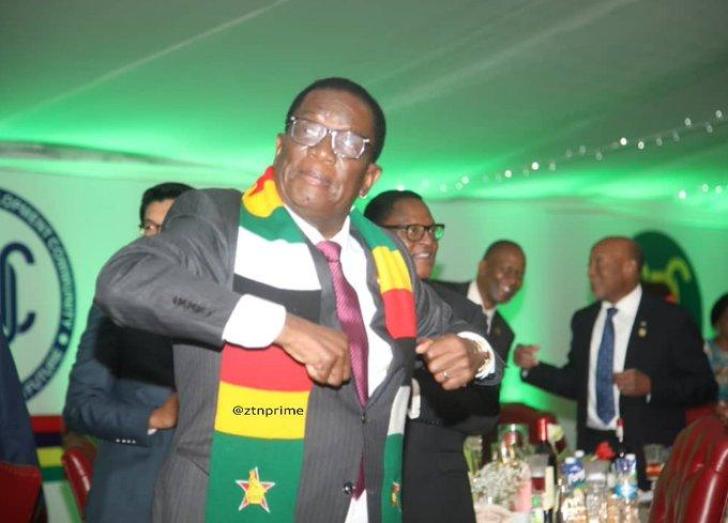News / National
Mnangagwa's ED2030 faction has plan for Zanu-PF conference
25 Oct 2024 at 13:58hrs |
1 Views

President Emmerson Mnangagwa and his allies are reportedly planning to propose a constitutional amendment at the upcoming Zanu-PF annual conference in Bulawayo to extend his presidency beyond the current two-term limit set for 2028. The ruling party's annual conference, set to take place from October 22 to 27 at the Zimbabwe International Trade Fair grounds, will host over 4,000 delegates, where this contentious issue is expected to dominate discussions.
According to an online publication Newshawks, sources revealed that Zanu-PF's plan includes garnering support from Citizens Coalition for Change (CCC) MPs allied with self-proclaimed secretary-general Sengezo Tshabangu. The proposal seeks to leverage Zanu-PF's two-thirds majority in the lower House, bypassing political rivalries, including Mnangagwa's ongoing succession battles with Vice President Constantino Chiwenga. "The plan is already in motion that at the conference we pass a resolution for a change in the constitution to allow President Mnangagwa to rule beyond 2028," disclosed a Zanu-PF insider.
Lovemore Matuke, Zanu-PF's secretary for national security, confirmed that discussions around this constitutional change are ongoing. "We have made amendments before, and this constitution is not cast in stone," he stated at a Zanu-PF provincial meeting. Similarly, national political commissar Munyaradzi Machacha supported the push, suggesting it reflects the "wishes of the people."
While local party structures have already started drafting resolutions in favor of Mnangagwa's extended leadership, legal hurdles remain. Constitutional experts argue that even if Zanu-PF can secure a two-thirds majority in the National Assembly, the same supermajority would be needed in the Senate. Given that the Senate has fixed seats for opposition MPs, achieving this majority would be challenging without opposition support.
Legal experts point to section 328 of Zimbabwe's constitution, which restricts current officeholders from benefitting from term limit changes. Lawyer and former MP Innocent Gonese emphasized that "sub-section 7 makes it very clear that any such amendment cannot then benefit the person who is in occupation of that particular office."
Under the constitution, extending presidential terms requires a referendum, a safeguard intended to prevent undue alterations that would benefit sitting officials. "You would need two referendums," explained Gonese, "first to remove the limitations of the specific section, and second to apply the extension."
The conference's outcome could prove significant for Mnangagwa's political future, yet any amendment would face both legal scrutiny and political maneuvering.
According to an online publication Newshawks, sources revealed that Zanu-PF's plan includes garnering support from Citizens Coalition for Change (CCC) MPs allied with self-proclaimed secretary-general Sengezo Tshabangu. The proposal seeks to leverage Zanu-PF's two-thirds majority in the lower House, bypassing political rivalries, including Mnangagwa's ongoing succession battles with Vice President Constantino Chiwenga. "The plan is already in motion that at the conference we pass a resolution for a change in the constitution to allow President Mnangagwa to rule beyond 2028," disclosed a Zanu-PF insider.
Lovemore Matuke, Zanu-PF's secretary for national security, confirmed that discussions around this constitutional change are ongoing. "We have made amendments before, and this constitution is not cast in stone," he stated at a Zanu-PF provincial meeting. Similarly, national political commissar Munyaradzi Machacha supported the push, suggesting it reflects the "wishes of the people."
While local party structures have already started drafting resolutions in favor of Mnangagwa's extended leadership, legal hurdles remain. Constitutional experts argue that even if Zanu-PF can secure a two-thirds majority in the National Assembly, the same supermajority would be needed in the Senate. Given that the Senate has fixed seats for opposition MPs, achieving this majority would be challenging without opposition support.
Legal experts point to section 328 of Zimbabwe's constitution, which restricts current officeholders from benefitting from term limit changes. Lawyer and former MP Innocent Gonese emphasized that "sub-section 7 makes it very clear that any such amendment cannot then benefit the person who is in occupation of that particular office."
Under the constitution, extending presidential terms requires a referendum, a safeguard intended to prevent undue alterations that would benefit sitting officials. "You would need two referendums," explained Gonese, "first to remove the limitations of the specific section, and second to apply the extension."
The conference's outcome could prove significant for Mnangagwa's political future, yet any amendment would face both legal scrutiny and political maneuvering.
Source - online
Join the discussion
Loading comments…



























